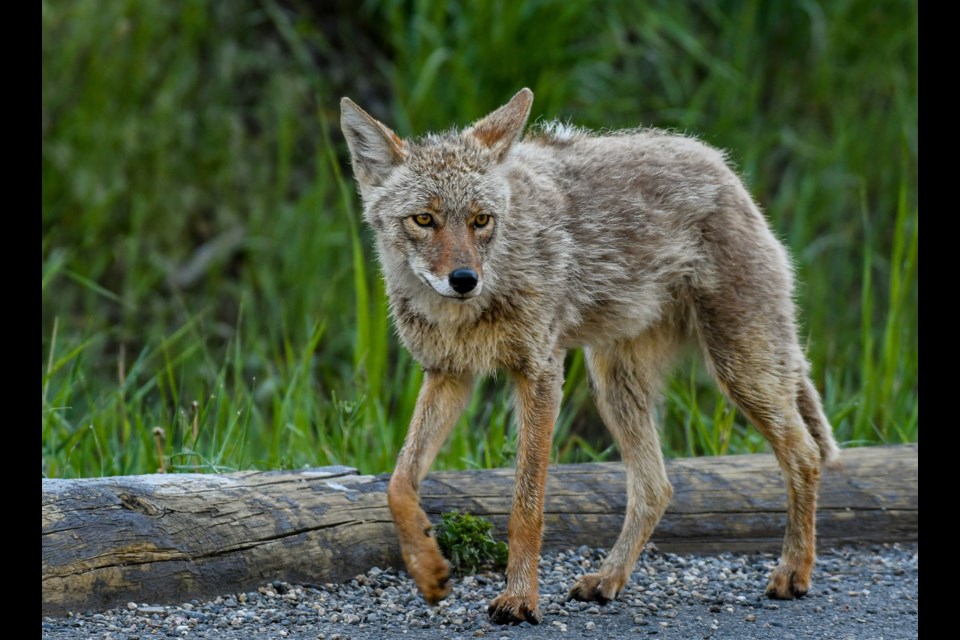THUNDER BAY — Rising coyote sightings in Thunder Bay's north end are causing some concern, including among users of walking trails behind the former Lakehead Psychiatric Hospital.
Last week, the day before school started, a coyote was spotted pursuing and killing a deer in the yard of St. Margaret School on Clayte Street, several blocks south of the wooded area behind the former LPH.
There have been numerous coyote sightings in other residential neighbourhoods.
"I don't want to be an alarmist, but I really want to have an informed approach. I want people to know what to do if they do see a coyote or even a pack of coyotes," said Len Maki, spokesperson for Friends of the LPH Greenspace.
Coyotes pose a potential threat, especially to pets.
"There's always been coyotes around. I've seen them over the years, but you know there's more and more reports, particularly on social media," Maki said.
He said his concern level grew after recent sightings of a coyote near the new playground area at Boulevard Lake.
"We have such great access to nature here in Thunder Bay, particularly around Boulevard, Centennial Park, the LPH trail area and other parts of the city too. But unfortunately that access to nature also means nature has access to us."
Maki wants to know if biologists are tracking the coyote population, and how worried families and pet-owners should be.
Brian McLaren, an associate professor in wildlife at Lakehead University, agrees that there have been a lot more encounters recently in the city and, most likely, across the Northwest region.
He said there's no source of information about the number of coyotes, and the best data the province would have would be for the number that are trapped and reported that way.
But he theorizes that the COVID-19 pandemic may have contributed to the coyote population getting larger.
Recent sightings, he said, likely involve juvenile coyotes born during a "baby bump" that occurred among various animal species when people were locked down and there was a lot less traffic on the road.
"Based on a couple of road kills that I've picked up because I have a collectors permit to do so, these are young coyotes, two years old last year and three years old this year. In very good condition."
He said dispersing juveniles are very easily hit by cars, and that traffic only returned to normal a year ago.
Coyotes in this part of the country are eastern coyotes, a larger canid that has bred extensively with wolves, "so there's wolf DNA in most of the eastern coyotes," McLaren noted.
"I think the threat is moreso to pets. There's always competition between canids. If dogs are wandering about, they're likely to be attacked by a coyote. It's just the territorial nature of all dogs."
But he cautioned that coyotes can carry rabies.
"Because they're scavengers more than hunters, they're going to be feeding on things that may have died of rabies, and that's common in many mammals...So I would advise the public to be very cautious if an animal looks like it's approaching people."
The Ministry of Natural Resources and Forestry was unable to provide a spokesperson for an interview provided a statement to TBnewswatch.
"If you see a coyote, keep your distance and they will most likely avoid you. Always keep your dog leashed when walking in areas that coyotes or other wildlife might inhabit, as they may consider off-leash dogs a threat or prey."
The ministry also offered tips when encountering an aggressive coyote:
- never approach or touch a coyote
- do not turn your back on, or run from, a coyote
- back away while remaining calm
- stand tall, wave your hands and make lots of noise
- carry a flashlight at night to scare off coyotes
- if a coyote poses an immediate threat or danger to public safety, call 911
Coyotes are present in cities throughout North America, and can be seen at any time of the day or night.
They have adapted well to life in urban areas, where food and shelter are plentiful, and natural predators are limited.
In Toronto, the city advises residents against walking dogs in ravine habitats, especially in the spring when coyotes have pups.
According to a published fact sheet about coyotes, they can behave in a defensive manner around dogs which is often interpreted as aggression.
"These negative interactions between dogs and coyotes are usually caused by bold behaviour from the dog. Coyotes are naturally timid, but they will defend their territory and their family group, including their pups," it states.
